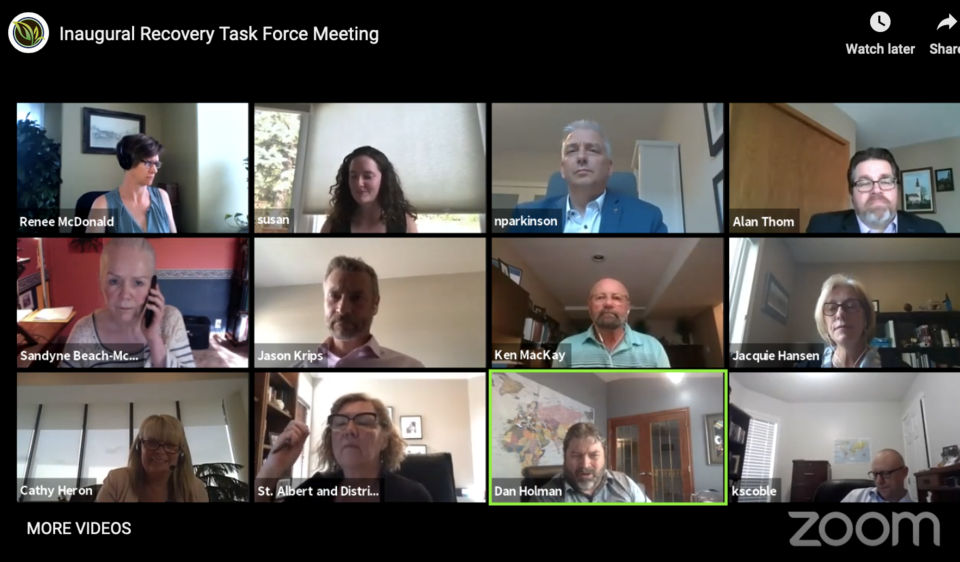The City of St. Albert's COVID-19 Recovery Task Force released its 35-page interim report last week, highlighting the group's discussions and priorities aimed at setting the city up for recovery from the pandemic.
In May, council approved the establishment of the volunteer task force as part of the city's Recovery Conceptual Plan under the mandate directing them to develop a report and recommendations for long-term recovery efforts.
Since then, the 10-member group has met biweekly for the last eight months to discuss impacts from COVID-19 on the community and an eventual path to recovery. The meetings are no longer streamed on YouTube, but either happen in person or through Zoom.
Earlier this year, council provided $2.4 million to cover costs for the city’s COVID-19 response. These funds are not used to support the task force, which has no budget, according to the city.
Work through the spring and summer months was focused on establishing the group's vision to "help frame the problems we were trying to address," said Alan Thom, task force member and associate partner with Ernst & Young, speaking to council on Dec. 21.
"The task force also identified several early wins, and thanks council for their support on these initiatives, including the establishment of development bonds, advocacy for a (COVID-19) testing site in St. Albert, and enhanced flexibility for restaurant patios," he said.
Recommendations
During the spring and summer, the task force settled on four areas they wanted to address: policies to help bolster the local economy, community attraction, supports for vulnerable populations and community resiliency. Through the fall, the task force talked about what outcomes they wanted to see in response, reaching out to residents through the city's Cultivate the Conversation platform for feedback.
St. Albertans pitched establishing a toolkit for businesses to help them adapt to changing restrictions, navigate grants and government assistance, promote year-round community activities, shop local initiatives, downtown attraction and mental health supports.
The task force prioritized four recommendations, including exploring options for business incentive programs, increasing community awareness of supports available, enabling spontaneous outdoor activity, and "reimagining" the city's relationship to social service groups.
Thom said part of the work early next year would be on how the recommendations would be implemented, but it's difficult to say what that looks like right now.
"We've done problem identification and some of the options for solutions, and now we'll have to move into the implementation of those options and what that means specifically," he said, noting supports could come within the first quarter of next year.
Coun. Wes Brodhead asked whether the task force had considered ways to unite a community that has been conflicted over COVID-19 restrictions and dealing with the emotional burden of the pandemic.
"How do we recover emotionally, as much as we are physically and economically?"
Thom said it was "a good question, and a difficult question." Spontaneous social activities to bring communities together in smaller groups first could "break down some of those barriers that have begun to form," he suggested.
Earlier in the year, the city's parks and recreation department spoke to the task force around potentially organizing some block parades in the neighbourhoods before new restrictions came in, said Mayor Cathy Heron, task force chair.
"Although we have begun to develop strategies into recovery, we are still in a response phase as we go through the second wave of the pandemic," Thom said.
Thom said the group will address any potential recommendations next year in collaboration with the city. Another meeting is tentatively set for Jan. 20.
Concerns
During the task force's last meeting on Dec. 9, Susan Monson, task force member and vice-president of community development with Melcor Developments, brought up concerns about whether the purpose of the task force was being understood in the community.
"Since our last meeting, twice, in two unrelated experiences that I had, people from the public have implied that we've formed this elite task force that's supposedly making COVID go away, and they're like, 'What are you guys actually doing? You really think you're going to change COVID?'" Monson said.
"We're not arrogantly thinking we're going to change the world for St. Albert, given the circumstances, but we're using this opportunity as a time to use it as a catalyst to look at ways we do business or the way we live in the city,"
Sandyne Beach-McCutcheon, task force member, said she believes the committee is unique from other organizations in the city in that "we're involved with something that's constantly evolving and changing" from when their work first started.
"This is not a static committee or board where your work plan is very clear, and you move some things forward, and you add some things. We're operating pretty much in real time with this," Beach-McCutcheon said.




